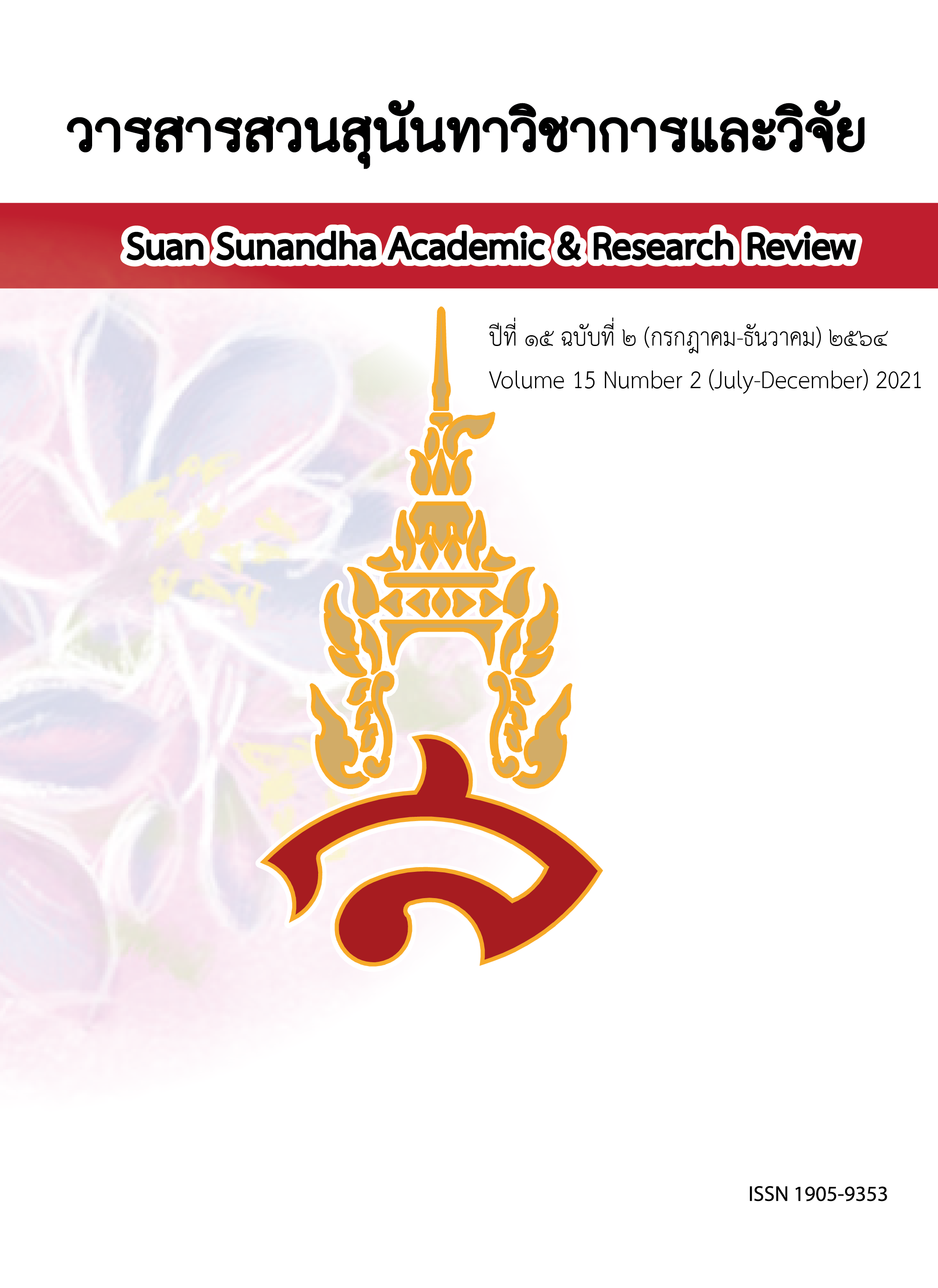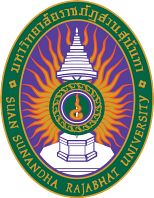การศึกษาเกี่ยวกับทัศนคติของวัยรุ่นไทยในเขตกรุงเทพมหานคร ที่มีต่ออาหารไทยโดยใช้ทฤษฎีปฏิสัมพันธ์เชิงสัญลักษณ์
คำสำคัญ:
วัยรุ่นไทย, ทัศนคติ, อาหารไทยบทคัดย่อ
จากสถิติการสำรวจภาวะน้ำหนักระดับประเทศพบว่า วัยรุ่นโดยเฉพาะในเขตกรุงเทพมหานครมีความชุกของวัยรุ่นที่มีภาวะน้ำหนักเกินและอ้วนมากที่สุดในประเทศ โดยตามสถิติแล้วช่วงอายุที่มีความชุกมากที่สุดคือช่วงอายุตั้งแต่ 15-19 ปี ซึ่งปรากฎการณ์นี้เป็นปรากฎการณ์ที่น่าสนใจ เนื่องมาจากประเทศไทยเป็นประเทศที่มีอาหารประจำชาติที่ได้ชื่อว่า เป็นอาหารที่ดีต่อสุขภาพที่สุดประเทศหนึ่ง ผู้วิจัยจึงทำการเก็บข้อมูลแบบสัมภาษณ์เชิงลึกเกี่ยวกับทัศนคติของวัยรุ่นในเขตกรุงเทพมหานคร จำนวน 15 คน จากการสุ่มตัวอย่างแบบง่าย โดยใช้ทฤษฎีปฏิสัมพันธ์เชิงสัญลักษณ์ในการวิเคราะห์ ผลปรากฏว่า กลุ่มตัวอย่างให้ความหมายเชิงสัญลักษณ์กับอาหารไทยว่าเป็น อาหารที่ธรรมดา แต่ให้ความหมายเชิงสัญลักษณ์ต่ออาหารต่างชาติว่าเป็นอาหารที่พิเศษ
เอกสารอ้างอิง
Agranat- Meged, A., Deitcher, C., Goldweig, G., Leibenson, L., Stein, M., Galili- Weisstub, E. (2005). Childhood obesity and attention deficit/ hyperactivity disorder: a newly described comorbidity in obese hospitalized children. Int J Eat Disorder. 37(4), 357-359.
Boonjo., W., Julokrungka., S. & Uthaipattanacheep., A. (2008). To educate health education to encourage Thai food consumption among students. J. Comm. Devel. Res.2(2): 83-91.
Chaisawadi, S., Darawan T., WarapornM.N. Pitakworarat, A.,Chaisawadi, K., Jaturonrasamee, JKhemkhaw, J. and Tanuthumchareon, W. (2005). Preliminary study of antimicrobial activities on medicinal herbs of Thai food ingredients. 675, 111-114.
Changreur., T.(2016). Interaction process and identity creation through dressing (hijab) of Muslim ladies in the Thai society. Journal of Communication and Innovation NIDA.3(2): 81-100.
Chareondej., J.(2002). Thai Food. Bangkok: Thai Insurance Company.
Dangubol., P. (2007).The study of the amount of Flavonoids and anti-oxidant in herbs used in Thai food. . [Master's thesis, Mahidol University].
Department of Trade Negotiations. (2019). Thai Restaurants. (Electronic Data). Trades between Thailand and Dialogue Partners. 2019 (Jan – May). 1-3.
Jinnavaso., R. & Poonsawad., P. (2017). Obesity. Bangkok: Faculty of medicine Ramathibodi Hospital, Mahidol University.
Karnik, S.& Kanekar, A. (2012). A Childhood obesity: a global public health crisis. Int J Prev Med, 3(1), 1-7.
Mo-suwan, L. (2011). Obesity and abdominal obesity in children and adolescents. Obesity and abdominal obesity. Bangkok: Sukhumvit Media Printing.
Nitiapaithum, K..(2004). Factors related to healthy food consumption of Kasetsart University’ students. [Master's thesis, Home Economics Education, Kasetsart University].
Nitituntiwat., P. & Udonsup., W. (2017). Thai food consumption behavior among Thai adolescent: Effect and Solutions. Journal of Phrapokklao Nursing College. 28(1), 122-128.
Nitiworrakarn., S. (2014). Thai Food: Cultural Heritage. Academic Journal Phranakhon Rajabhat University.
Noin, K. (2017). Overweight and obese among Thai students and adolescents. Journal of The Royal Thai Army Nurses.18. (Special Issue), 1-8.
Pitiwan., T. (2012). Trends of accepting Thai food among foreign tourists to four regions Thai food and Thai dessert. [Master's thesis, Rajamangala University of Technology Thanyaburi].
Pongutha., S. & Khunpeuk., W. (2015). Food and Nutrition in Thailand: Where are we at now? (Annual Report). Nonthaburi: Food and nutrition policy for health promotion. International Health Policy Program Foundation: Ministry of Health.
Pulgaron, ER. (2013). Childhood obesity: a review of increased risk for physical and psychological comorbidities. Clin Ther. 35(1), 18-32.
Reily, J., Methven, E., McDowell, Z., Hacking, B., Alexander, D., Stewart, L. (2003). Health consequence of obesity. Arch Dis Child. 88(9). 748-752.
Reungrungsee., N. (1999). Spices. Bangkok: Chulalongkorn University Press.
Ritzer, G. & Goodman, D. (2004). Modern sociological theory. 2004. 217-218.
Secondary Educational Service Area Office. (2019). Secondary educational service area information. Retrieved January 25, 2019 from http://www.odos.moe.go.th/news_detail.php?NewsTitleID=487
Techoapiwattanakul., L. (2007). Attitude and Thai food consumption behavior of Rajamangala University of Technology in Bangkok. [Master's thesis, Kasetsart University].
Thidhayasathan., W. (1999). Thai Food- Healthy Food.[Master's thesis, Mahidol University].
Thanaruk., T.& Plawong., K. (2004). Knowledge about Thai food. Academic Journal: Utaradit Rajabhat University. 2(4), 106-114.
Yunyongkasemsuk., R. (2013). Symbolic interaction theory and the explanation of social phenomena toward actor’s view. Journal of Politics Administration and Law. 5(2): 69-89.
ดาวน์โหลด
เผยแพร่แล้ว
รูปแบบการอ้างอิง
ฉบับ
ประเภทบทความ
สัญญาอนุญาต
บทความที่ได้รับการตีพิมพ์เป็นลิขสิทธิ์ของ สถาบันวิจัยและพัฒนา มหาวิทยาลัยราชภัฎสวนสุนันทา
ข้อความที่ปรากฏในบทความแต่ละเรื่องในวารสารวิชาการเล่มนี้เป็นความคิดเห็นส่วนตัวของผู้เขียนแต่ละท่านไม่เกี่ยวข้องกับมหาวิทยาลัยราชภัฎสวนสุนันทา และคณาจารย์ท่านอื่นๆในมหาวิทยาลัยฯ แต่อย่างใด ความรับผิดชอบองค์ประกอบทั้งหมดของบทความแต่ละเรื่องเป็นของผู้เขียนแต่ละท่าน หากมีความผิดพลาดใดๆ ผู้เขียนแต่ละท่านจะรับผิดชอบบทความของตนเองแต่ผู้เดียว






